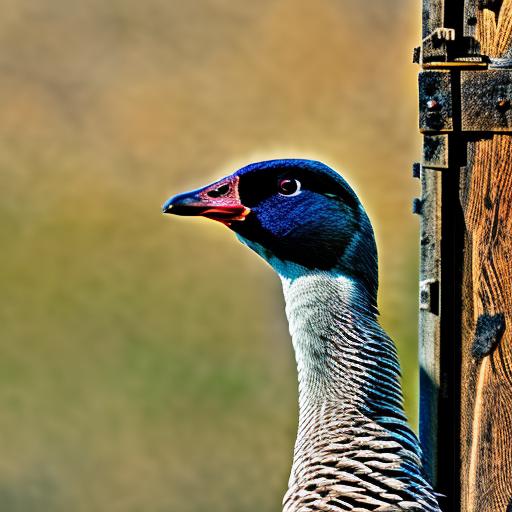Electric fencing is a type of barrier that uses an electric shock to deter animals from crossing it. It works by delivering a harmless but memorable shock to the animal when it comes into contact with the fence. This shock serves as a deterrent, teaching the animal to avoid the fence in the future. Electric fencing has been used for a variety of purposes, including livestock containment and predator control. In recent years, it has also gained popularity as an effective method for geese control.
Geese can be a nuisance for property owners, especially those who live near bodies of water or open fields. They are known for their aggressive behavior, loud honking, and messy droppings. Geese can cause damage to lawns, gardens, and crops, and their droppings can create unsightly and unsanitary conditions. Additionally, geese can become territorial and aggressive during nesting season, posing a threat to humans and other animals.
Key Takeaways
- Electric fencing is an effective solution for controlling geese on your property.
- Understanding geese behavior and their impact on your property is important when choosing an electric fence.
- Benefits of using electric fencing for geese control include affordability and low maintenance.
- There are different types of electric fencing available for geese control, including solar-powered options.
- Factors to consider when choosing an electric fence for geese include the size of your property and the number of geese you need to control.
Understanding Geese Behaviour and their Impact on Property
Geese are social animals that often travel in large flocks. They are attracted to areas with open water, lush vegetation, and ample food sources. When geese find a suitable location, they will often stay for an extended period of time, causing damage to the property in the process.
One of the main issues with geese is their droppings. Geese produce a large amount of waste, which can quickly accumulate on lawns, sidewalks, and other outdoor areas. Not only is this unsightly, but it can also create slippery conditions and pose health risks.
Geese are also known for their aggressive behavior, especially during nesting season. They will defend their nests and young against perceived threats, which can include humans and other animals. This aggression can be intimidating and potentially dangerous.
Benefits of Using Electric Fencing for Geese Control
Using electric fencing for geese control offers several benefits. Firstly, it is an effective deterrent. The shock delivered by the fence is enough to startle and discourage geese from attempting to cross it. Over time, geese learn to associate the fence with the unpleasant shock and will avoid it altogether.
Electric fencing is also an affordable option for geese control. Compared to other methods such as hiring professional pest control services or installing physical barriers, electric fencing is relatively inexpensive. Once installed, it requires minimal maintenance and can last for many years.
Furthermore, electric fencing can be a humane solution for geese control. The shock delivered by the fence is not harmful or life-threatening to the geese. It simply serves as a deterrent to prevent them from causing damage to the property. This makes electric fencing a more ethical choice compared to methods that involve trapping or harming the geese.
Types of Electric Fencing for Geese Control
There are different types of electric fencing available for geese control, each with its own advantages and disadvantages. Permanent electric fencing is a popular choice for property owners who want a long-term solution. It consists of sturdy posts and wires that are designed to withstand the elements and deter geese from crossing.
Portable electric fencing, on the other hand, is a more flexible option. It can be easily moved and adjusted as needed, making it ideal for temporary situations or areas where permanent fencing is not feasible. Portable electric fencing typically consists of lightweight posts and wires that can be set up and taken down quickly.
Both types of electric fencing can be effective in deterring geese, but they have different considerations to take into account. Permanent fencing requires more upfront investment and installation time, but it offers long-term durability and reliability. Portable fencing is more affordable and convenient, but it may not be as sturdy or effective in deterring determined geese.
Factors to Consider When Choosing an Electric Fence for Geese
When choosing an electric fence for geese control, there are several factors to consider. The size of the property is an important consideration, as it will determine the amount of fencing needed. Larger properties may require more extensive fencing to effectively deter geese.
The behavior of the geese should also be taken into account. Some geese may be more determined or persistent than others, and may require a stronger or more secure fence. Additionally, the presence of other animals or potential predators in the area should be considered, as they may also be affected by the electric fence.
The landscape of the property should also be considered. If there are obstacles such as trees or uneven terrain, it may affect the installation and effectiveness of the electric fence. In some cases, additional measures such as underground wires or netting may be needed to prevent geese from finding alternative routes.
Installation and Maintenance of Electric Fencing for Geese Control

Installing an electric fence for geese control requires careful planning and preparation. The first step is to determine the layout and design of the fence. This includes deciding on the location of the posts, the height and spacing of the wires, and any additional features such as gates or warning signs.
Once the design is finalized, the next step is to install the fence. This involves digging holes for the posts, securing them in place, and attaching the wires. It is important to follow the manufacturer’s instructions and guidelines to ensure proper installation and effectiveness.
After the fence is installed, regular maintenance is necessary to keep it in good working condition. This includes checking for any damage or wear and tear, replacing any faulty components, and keeping vegetation clear from the fence to prevent interference with its effectiveness.
How Effective is Electric Fencing in Keeping Geese Out?
Electric fencing has been proven to be highly effective in keeping geese out of properties. The shock delivered by the fence serves as a strong deterrent, teaching geese to avoid the area altogether. Over time, geese learn to associate the fence with the unpleasant shock and will avoid it.
There have been numerous successful cases of geese control using electric fencing. Property owners have reported a significant reduction in geese activity and damage after installing electric fences. In some cases, geese have completely stopped visiting the property altogether.
However, it is important to note that no method is 100% foolproof. Some determined or persistent geese may still attempt to cross the fence, especially if they are highly motivated by food or nesting sites. In these cases, additional measures such as scare tactics or physical barriers may be necessary.
Alternatives to Electric Fencing for Geese Control
While electric fencing is an effective method for geese control, there are alternative methods that can also be considered. Scare tactics, such as using decoys or noise-making devices, can be effective in deterring geese from a property. Physical barriers, such as netting or fencing, can also be used to prevent geese from accessing certain areas.
Each method has its own pros and cons. Scare tactics are relatively inexpensive and easy to implement, but they may not be as effective in deterring determined geese. Physical barriers can be more effective in preventing geese from accessing certain areas, but they may require more upfront investment and maintenance.
It is important to consider the specific needs and circumstances of the property when choosing a geese control method. Electric fencing may be the most suitable option for some property owners, while others may find alternative methods more effective or practical.
Legal Considerations for Using Electric Fencing for Geese Control
Before installing an electric fence for geese control, it is important to consider any legal considerations or regulations that may apply. In some areas, there may be restrictions on the use of electric fencing or specific requirements that must be met.
It is recommended to check with local authorities or consult with a professional to ensure compliance with any applicable laws or regulations. This can help prevent any legal issues or conflicts with neighbors.
Is Electric Fencing the Right Solution for Your Geese Control Needs?
In conclusion, electric fencing is an effective and affordable method for geese control. It offers several benefits, including its effectiveness in deterring geese, its affordability, and its humane nature. However, it is important to consider the specific needs and circumstances of the property when choosing a geese control method.
Property owners should consider factors such as the size of the property, the behavior of the geese, and any legal considerations before deciding on an electric fence. Additionally, it may be helpful to consult with professionals or seek advice from others who have experience with geese control.
By carefully considering these factors and choosing the right geese control method, property owners can effectively deter geese and protect their property from damage.
If you’re looking for effective ways to keep geese out of your property, you may want to consider installing an electric fence. Electric fences are known for their ability to deter various types of animals, including geese. To learn more about how electric fences can be used to keep geese away, check out this informative article on Poultry Wizard: Will Electric Fence Keep Geese Out? Along with this article, Poultry Wizard also offers valuable resources on topics such as chicken coop nest boxes, feeding ducks, and insulating chicken coops.
FAQs
What is an electric fence?
An electric fence is a barrier that uses electric shocks to deter animals or people from crossing a boundary.
Will an electric fence keep geese out?
Yes, an electric fence can be an effective way to keep geese out of an area. The shock from the fence will deter the geese from attempting to cross the boundary.
How does an electric fence work?
An electric fence works by sending a high voltage electric pulse through a wire or tape that is attached to posts. When an animal or person touches the wire, they complete the circuit and receive a shock.
Is an electric fence safe for geese?
Yes, an electric fence is safe for geese. The shock from the fence is not strong enough to cause any harm to the geese, but it is enough to deter them from crossing the boundary.
What type of electric fence is best for keeping geese out?
A low-impedance electric fence is best for keeping geese out. This type of fence delivers a strong, consistent shock that is effective at deterring geese.
What are the benefits of using an electric fence to keep geese out?
Using an electric fence to keep geese out is a humane and effective way to protect your property. It is also a cost-effective solution that requires minimal maintenance.
Meet Walter, the feathered-friend fanatic of Florida! Nestled in the sunshine state, Walter struts through life with his feathered companions, clucking his way to happiness. With a coop that’s fancier than a five-star hotel, he’s the Don Juan of the chicken world. When he’s not teaching his hens to do the cha-cha, you’ll find him in a heated debate with his prized rooster, Sir Clucks-a-Lot. Walter’s poultry passion is no yolk; he’s the sunny-side-up guy you never knew you needed in your flock of friends!







